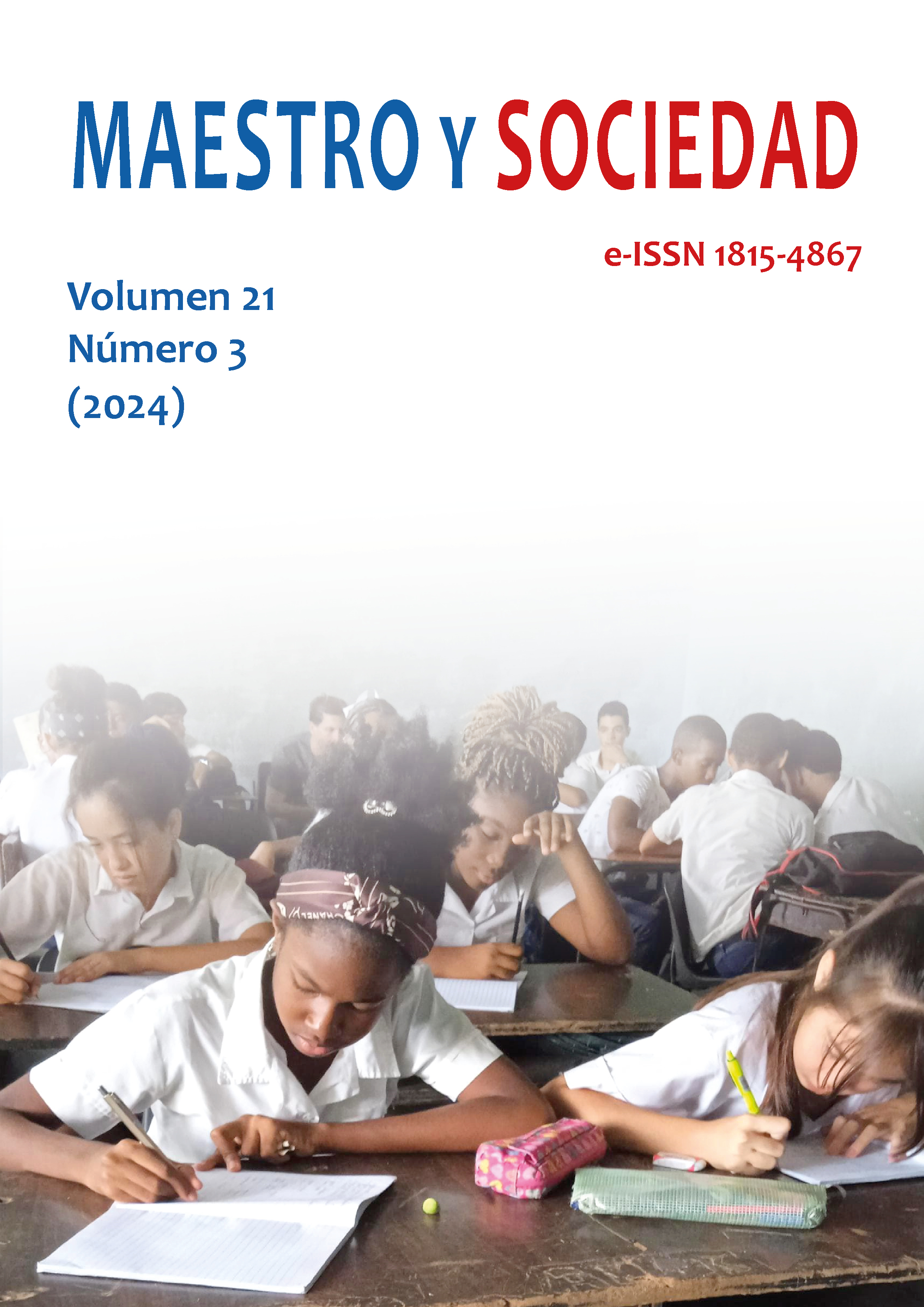Gamification as a teaching strategy for empowerment learning in the ninth grade of the “Educational Unit 26 de Febrero”
Keywords:
intrinsic motivation, teaching strategy, gamification teaching strategy, gamification, empowermentAbstract
Introduction: The research is posed as a scientific problem how to improve the resolution of exercises of empowerment in the 9th of the "Educational Unit 26 de Febrero"? Hence, its object of study constitutes the process of teaching - learning of Mathematics in ninth grade, so the field of action is limited to the resolution of exercises of empowerment through gamification. In correspondence with this, the objective is to analyze the impact of a didactic strategy of gamification oriented to the resolution of exercises of empowerment by ninth grade students of the "Educational Unit 26 de Febrero". Materials and methods: The research is developed from a mixed approach with a descriptive scope, in addition to being supported by the use, mainly, of techniques such as survey, observation and documentary review, in addition to theoretical methods. In order to evaluate the students' perceptions about the gamification teaching strategy "Battle of Powers", a questionnaire structured in three dimensions was designed: motivation, learning and evaluation, which was subjected to a Cronbach's Alpha and resulted in excellent internal consistency. Results: The results obtained indicate a great acceptance by the students of the gamification teaching strategy, identifying the activity as a motivating and attractive resource that contributes significantly to the learning of empowerment. The teaching strategy is highly valued by specialists who, from their expertise, gave it their support. Discussion: Gamification as a teaching strategy in the teaching of Mathematics contributes to the strengthening of mathematical competences in students, to the acquisition of knowledge and skills in a significant way and to the development of positive attitudes, especially collaborative behaviors among students. Conclusions: The gamification teaching strategy has been shown to have a positive impact on the learning of ninth grade students at the “Unidad Educativa 26 de Febrero” and is considered viable and integrable into the school curriculum, which means an important contribution to the field of educational research in general and to mathematics education in particular.
References
Álvarez, C. y Erazo, J. (2021). Gamificación en el proceso de enseñanza de algebra: una experiencia con educarplay. Cienciometría, 7(3), 225248. https://www.cienciamatriarevista.org.ve/index.php/cm/article/view/578.
Antonio, Q. M. (2022). La gamificación como estrategia didáctica para la enseñanza y aprendizaje en la competencia numérica en el área de matemática. [Tesis de Maestría, Universidad Técnica del Norte].
Ausubel, D. P. (2002). Adquisición y retención del conocimiento. Una perspectiva cognitiva. Ed. Paidós. Barcelona.
Caponetto; Earp, J. y Ott, Michela. (2014). Gamification and education: a literature review. In: European conference on games-based learning, 8., 2014, Berlín. Actas… Berlín: University of Applied Sciencies, 2014. p. 50-57.
Contreras-Espinosa, R. S. (2016). Juegos digitales y gamificación aplicados en el ámbito de la educación. [Digital games and gamification applied in the field of education]. RIED. Revista Iberoamericana de Educación a Distancia, 19(2), 27–33. https://n9.cl/puy2b.
Contreras, R. Eguia, Luis. (2016), “Gamificación en Aulas Universitarias”, Instituto de la Comunicación, Universidad Autónoma de Barcelona.
Deci, E. L., & Ryan, R. M. (1985). Intrinsic motivation and self-determination in human behavior. Springer Science & Business Media.
Deterding, S., Dixon, D., Khaled, R. y Nacke, L. (2011). De los elementos de diseño de juegos a la alegría: definiendo la "gamificación". Actas de la 15ª Conferencia Académica Internacional MindTrek: Visualizando entornos mediáticos futuros, 9-15.
Dweck, C. S. (2006). Mentalidad: La nueva psicología del éxito. Random House.
Dicheva, D., Dichev, C., Agre, G. y Angelova, G. (2015). Gamificación en la educación: un estudio de mapeo sistemático. Revista de tecnología y sociedad educativa, 18 (3), 75-88.
Hamari, J., Koivisto, J. y Sarsa, H. (2014). ¿Funciona la gamificación? - Una revisión bibliográfica de estudios empíricos sobre gamificación. 2014 47ª Conferencia Internacional de Hawaii sobre Ciencias de Sistemas, 3025-3034.
Herreros, D. y Sanz, M.T. (2020). Estadística en educación primaria a través del aprendizaje basado en juegos. Matemáticas, Educación y Sociedad, 3(1), 33-47.
Kapp, K. M. (2012). The Gamification of Learning and Instruction: Game-Based Methods and Strategies for Training and Education. International Journal of Gaming and ComputerMediated Simulations, 4(4), 81-83. Dosponible en: https:// doi.org/10.4018/jgcms.2012100106.
Keyser, M. W. (2000). Active Learning and Cooperative Learning: Understanding the Difference and Using Both Styles Effectively. Research Strategies, 17(1), 35-40.
Morales, J. (2013). La gamificación en la universidad para mejorar los resultados académicos de los alumnos.Quinto Congreso Virtual Iberoamericano de Calidad En Educación Virtual ya Distancia, 1–15. Disponible en: ttp://eprints.uanl. mx/8087/1/m8_2.pdf.
Murua-Cuesta, E. (2013). Análisis de la Gamificación como concepto aplicable en el proceso de Enseñanza aprendizaje de las matemáticas en 4º de ESO. [Tesis de maestría, Universidad Internacional de La Rioja]. Repositorio Institucional de la UNIR. https://reunir.unir.net/handle/123456789/2056.
Ortiz y Claudio Guevara (2021). Gamificación en la enseñanza de Matemáticas. http://portal.amelica.org/ameli/journal/258/2582582011/html/
Pauletti, C. y Astudillo, G. (2021). La gamificación como estrategia didáctica en geometría. (s.e.).
Pérez, A., & Ramírez, R. (2020). Dificultades en el aprendizaje de la potenciación en estudiantes de noveno grado. Revista de Investigación, Desarrollo e Innovación, 10(2), 321-334.
Sánchez, L. & Gómez, M. (2018). Estrategias didácticas para la enseñanza de la potenciación en matemáticas. Educación y Ciencia, 7(49), 45-58.
Vigotsky, L. S. (1987). Historia del desarrollo de las funciones psíquicas superiores. Editorial Científico Técnica, .
Zambrano, M. (2020). La Gamificación como estrategia de aprendizaje. Webinars sobre e-learning, innovación y competencias digitales. Plan de formación, apoyo y reconocimiento al profesorado 2020-21. Universidad Internacional de Andalucía.
Published
How to Cite
Issue
Section
License
Copyright (c) 2024 José Bolívar Caguana León, Walter Vicente Ordóñez Ordóñez, Katia Lisset Fernández Rodríguez, Wilber Ortiz Aguilar

This work is licensed under a Creative Commons Attribution-NonCommercial-NoDerivatives 4.0 International License.
This journal provides immediate open access to its content, based on the principle that offering the public free access to research helps a greater global exchange of knowledge. Each author is responsible for the content of each of their articles.



























 Universidad de Oriente
Universidad de Oriente 